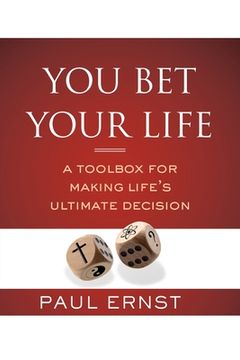Compartir
You Bet Your Life: A Toolbox for Making Life's Ultimate Decision (en Inglés)
Paul Ernst
(Autor)
·
Createspace Independent Publishing Platform
· Tapa Blanda
You Bet Your Life: A Toolbox for Making Life's Ultimate Decision (en Inglés) - Ernst, Paul
$ 386.66
$ 644.44
Ahorras: $ 257.78
Elige la lista en la que quieres agregar tu producto o crea una nueva lista
✓ Producto agregado correctamente a la lista de deseos.
Ir a Mis Listas
Origen: Estados Unidos
(Costos de importación incluídos en el precio)
Se enviará desde nuestra bodega entre el
Lunes 22 de Julio y el
Martes 30 de Julio.
Lo recibirás en cualquier lugar de México entre 1 y 3 días hábiles luego del envío.
Reseña del libro "You Bet Your Life: A Toolbox for Making Life's Ultimate Decision (en Inglés)"
This work is for the benefit of the modern skeptic that is open to possibly re-thinking their position and for Christians who have friends and family looking for a rational way out of their unbelief. The book starts with the indisputable: someday you are going to die. The question is, what's next? Since one's eternal state is forever, the thoughtful person should seek to obtain the best possible outcome. At one time religious traditions informed us about our fate, but the secular person has been cut off from traditional answers. One is left with the nihilism of scientific materialism or an irrational leap into mysticism. But perhaps today's most common alternative is to distract oneself with things of the world-entertainment, achievement, etc.At the beginning of the Enlightenment, the French mathematician Blaise Pascal noticed similar tendencies in affluent Paris. He was outraged that his friends would be so reckless with their souls. Framing his plea against the backdrop of Pascal's famous Wager, author Paul Ernst takes the reader through the cumulative case that a group of men and woman 2000 years ago were not merely pre-scientific and gullible, but were shaped by an event that would cause them to reject their own beliefs and give up everything for what they knew to be true. The early chapters are about establishing a method for evaluating truth claims and evidence. As most people do not have a clearly thought out worldview, Ernst lays out a simple but unexpectedly robust map for thinking about philosophical systems. The worldviews of Naturalism, Theism and Eastern Pantheism are set out so that the reader might be able to better identify their own faith commitments. At the same time Ernst exposes the myth of "neutrality" concerning ultimate ideas.The next part of the book lays out the case for a Being like the Judeo-Christian God from the evidence of the natural world. The Kalam Cosmological Argument as set forth by Dr. William Lane Craig and the design inference of Dr. William Dembsky are made accessible to the general reader.Ernst then sets up the plausibility of the claims of the earliest Christians with a defense of miracles based on C. S. Lewis's refutation of skeptic David Hume and the pretensions and limitations of modern science.The specific claims of the New Testament are examined using sound historical methodology based on what most 1st century historians, and not theologians, actually believe. Jesus' claims of deity are examined against a 1st century Jewish backdrop-the only one with the proper context. The resurrection of Jesus far exceeds any naturalistic explanation for basic facts believed by the majority of scholars.After the positive evidence, Ernst deals with classic objections to Theistic belief-such as the problem of evil, the hiddenness of God and alleged falsehoods in the Bible. There is solid defense of the Bible as God's revelation that makes its case based on the Bible's own internal evidence without resorting to circular reasoning.The author details his own hard-fought intellectual journey against doubt and his own anti-supernatural presuppositions. This is contrasted with the path taken by the famous atheist Antony Flew who likewise found the evidence compelling but never came to faith. The author believes Flew lacked the desire for eternal life. Ernst candidly admits that a fear of judgment and the dread of nonexistence were central for him, as they should be for all.In the final chapters, the love of God is demonstrated through his gracious offer to all his creatures and examples are given as to what it means to trust God. The book finishes with what Jesus' followers say is the way to secure eternal life.
- 0% (0)
- 0% (0)
- 0% (0)
- 0% (0)
- 0% (0)
Todos los libros de nuestro catálogo son Originales.
El libro está escrito en Inglés.
La encuadernación de esta edición es Tapa Blanda.
✓ Producto agregado correctamente al carro, Ir a Pagar.

